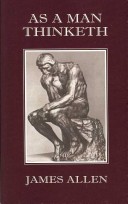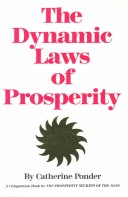 In keeping with my intention to write about my favorite self-help authors, I will start with the overall idea that was so profoundly suggested in James Allen’s book title, As a Man Thinketh.
In keeping with my intention to write about my favorite self-help authors, I will start with the overall idea that was so profoundly suggested in James Allen’s book title, As a Man Thinketh.
The idea that you can think up something and shoot it out to the Universe and have your wildest dreams realized was not the sole property of Rhonda Byrne, author of The Secret. The well-known name for the phenomenon she illustrated in her book is the Law of Attraction, and that idea goes back a long time–some would say as far back as the Old Testament.
I couldn’t even begin to list all the influential authors and thinkers who have written about this basic principle, but I’d love to know why we don’t practice more of it.
One of the things that has always put me off some Law of Attraction books is that they sometimes are packaged as a Genie in a Bottle, or as Dorothy’s ruby slippers. All you have to do is click your heels three times and you get anything you wish for–a veritable Christmas morning of wealth, health and happiness. Some evangelical Christian preachers exhort their congregations to open up their arms, or their purses, and wealth and prosperity will be theirs, like manna in the desert. As my friend Dolores used to say, “Ahhhhh don’t think so.”
I can’t help but think that this is a abuse of power. Do we have the power? Yes, I believe we do. I believe I’ve experienced it myself, when I went from being a timid sheep of a worker in the typing pool to Vice President of a major market research company, and ultimately to owner of my own company. I went from an “I can’t” kind of gal to a “I can” one, and with the help of some of the authors I will present in this blog, those two words literally changed my life.
So, do I believe in the power of thought, or the Law of Attraction? Undoubtedly. “What man can believe, he can achieve.” But let’s not use it the same way the fisherwoman used the magic fish in the fable–simply ordering good fortune without gratitude or purpose. Let’s use it to open up a channel to hear God within and trust that the divine intention will power the Law of Attraction to the benefit of the Universe and its inhabitants.
So, here are three of my favorite Law of Attraction books, and I’m not going to include the Secret because it’s gotten its fair share of deserved notoreity. I’d like to highlight some oldies but goodies:
 James Allen: As a Man Thinketh: Free eDowloads are available, or there are all kinds of printings of it. This is a classic, and is beautiful in its simplicity and brevity. Amazon’s Editor’s Review says,
James Allen: As a Man Thinketh: Free eDowloads are available, or there are all kinds of printings of it. This is a classic, and is beautiful in its simplicity and brevity. Amazon’s Editor’s Review says,
“In As a Man Thinketh, James Allen reveals how our thoughts determine reality. Whether or not we are conscious of it, our underlying beliefs shape our character, our health and appearance, our circumstances, and our destinies. Allen shows how we can master our thoughts to create the life we want, lest we drift through life unconscious of the inner forces that keep us mired in failure and frustration.”
James Allen quote: “For true success ask yourself these four questions: Why? Why not? Why not me? Why not now?”
Charles F. Haanel’s The Master Key System: I have to be honest. I just recently downloaded this classic. You can open it immediately with this link, thanks to The Secret website. But I’ve read all the classics, and I’ve constantly read references to the Master Key System. It was written way back in 1912, but it is far from irrelevant. I read recently that Bill Gates read it in college and that’s when he dropped out of Harvard to start Microsoft.
Charles F. Haanel quote: “And as the most powerful forces of Nature are the invisible forces, so we find that the most powerful forces of man are his invisible forces, his spiritual force.”
 Catherine Ponder, The Dynamic Laws of Prosperity. Catherine wrote prolifically about the “Laws” of all good things: health, prosperity, goodwill. I like her books, and I read them, but I have to admit that her books smack a little too close to the Genie in the Bottle approach. She has scads of stories of people whose lives turned around by following her “laws,” and that may be so, but her sales pitch is a little strong–probably because she wrote for people just emerging from the Great Depression. However, I find the ideas themselves good reinforcement–she promotes visualization, prayer, self-confidence, and hard work and persistence. Plus, I am happy to recommend a good female self-help author.
Catherine Ponder, The Dynamic Laws of Prosperity. Catherine wrote prolifically about the “Laws” of all good things: health, prosperity, goodwill. I like her books, and I read them, but I have to admit that her books smack a little too close to the Genie in the Bottle approach. She has scads of stories of people whose lives turned around by following her “laws,” and that may be so, but her sales pitch is a little strong–probably because she wrote for people just emerging from the Great Depression. However, I find the ideas themselves good reinforcement–she promotes visualization, prayer, self-confidence, and hard work and persistence. Plus, I am happy to recommend a good female self-help author.
Catherine Ponder quote: “The forgiving state of mind is a magnetic power for attracting good.”
These authors built the foundation for Rhonda Byrne and Wayne Dyer and all the other more recent notable Law of Attraction authors. The language is a little different from what we’re used to–they were a far cry from the language-barren world of Twitter! But if you can get past that, they have the power to help you change your thinking–and thus, your life.

Recent Comments